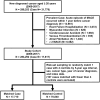Cardiovascular Toxicity of Angiogenesis Inhibitors Among Patients With Cancer in Taiwan: A Nested Case-Control Study
- PMID: 38156594
- PMCID: PMC10863808
- DOI: 10.1161/JAHA.123.030263
Cardiovascular Toxicity of Angiogenesis Inhibitors Among Patients With Cancer in Taiwan: A Nested Case-Control Study
Abstract
Background: Research on the cardiovascular toxicity of angiogenesis inhibitors among patients with cancer in Taiwan is lacking. This observational study explored the risk of major adverse cardiovascular events (MACEs) associated with angiogenesis inhibitors in Taiwan.
Methods and results: We conducted a nested case-control study using the TCR (Taiwan Cancer Registry) linked with the Taiwan National Insurance Claim Database. We matched every case with 4 controls using risk-set sampling by index date, age, sex, cancer type, and cancer diagnosis date. Conditional logistic regression was used to evaluate the risks of MACEs and different cardiovascular events using propensity score adjustment or matching. Sensitivity analyses were used to evaluate the risks matched by cancer stages or exposure within 1 year. Among a cohort of 284 292 after the exclusion of prevalent cases, the incidences of MACEs among the overall cohort and those exposed to angiogenesis inhibitors were 22.5 and 32.5 events per 1000 person-years, respectively. We matched 17 817 cases with 70 740 controls, with a mean age of 74.9 years, and 56.8% of patients were men. After propensity score adjustment, angiogenesis inhibitors were associated with increased risks of MACEs (odds ratio, 4.56; 95% CI, 1.78-11.59). Significantly increased risks were noted for heart failure hospitalization, myocardial infarction, cerebrovascular accident, and venous thromboembolism, but not for new-onset atrial fibrillation. Similar results were observed after matching by cancer stage or restriction of 1-year exposure.
Conclusions: Angiogenesis inhibitors were associated with increased risks of MACEs among patients with various malignancies in Taiwan but were not associated with new-onset atrial fibrillation.
Keywords: angiogenesis inhibitors; cardiotoxicity; cardiovascular system; vascular endothelial growth factors.
Figures
Similar articles
-
Adverse events with intravitreal injection of vascular endothelial growth factor inhibitors: nested case-control study.BMJ. 2012 Jul 4;345:e4203. doi: 10.1136/bmj.e4203. BMJ. 2012. PMID: 22763393 Free PMC article.
-
Cardiovascular Outcomes of Dipeptidyl Peptidase-4 Inhibitors in Elderly Patients With Type 2 Diabetes: A Nationwide Study.J Am Med Dir Assoc. 2016 Jan;17(1):59-64. doi: 10.1016/j.jamda.2015.10.009. Epub 2015 Nov 21. J Am Med Dir Assoc. 2016. PMID: 26612484
-
The risk of major adverse cardiovascular events in patients with systemic sclerosis: a nationwide, population-based cohort study.Rheumatology (Oxford). 2024 Aug 1;63(8):2074-2081. doi: 10.1093/rheumatology/kead464. Rheumatology (Oxford). 2024. PMID: 37695290
-
Proton-Pump Inhibitor Use and the Risk of First-Time Ischemic Stroke in the General Population: A Nationwide Population-Based Study.Am J Gastroenterol. 2017 Jul;112(7):1084-1093. doi: 10.1038/ajg.2017.101. Epub 2017 Apr 11. Am J Gastroenterol. 2017. PMID: 28397874
-
Effects of DPP-4 inhibitors on cardiovascular outcomes in patients with type 2 diabetes and end-stage renal disease.Int J Cardiol. 2016 Sep 1;218:170-175. doi: 10.1016/j.ijcard.2016.05.062. Epub 2016 May 14. Int J Cardiol. 2016. PMID: 27236110
Cited by
-
Angiogenesis in Atrial Fibrillation: A Literature Review.Biomedicines. 2025 Jun 6;13(6):1399. doi: 10.3390/biomedicines13061399. Biomedicines. 2025. PMID: 40564118 Free PMC article. Review.
-
Post-transplant cyclophosphamide-induced cardiotoxicity: A comprehensive review.J Cardiovasc Thorac Res. 2024;16(4):211-221. doi: 10.34172/jcvtr.33230. Epub 2024 Dec 23. J Cardiovasc Thorac Res. 2024. PMID: 40027370 Free PMC article. Review.
References
-
- Totzeck M, Mincu RI, Mrotzek S, Schadendorf D, Rassaf T. Cardiovascular diseases in patients receiving small molecules with anti‐vascular endothelial growth factor activity: a meta‐analysis of approximately 29,000 cancer patients. Eur J Prev Cardiol. 2018;25:482–494. doi: 10.1177/2047487318755193 - DOI - PubMed
Publication types
MeSH terms
Substances
LinkOut - more resources
Full Text Sources
Medical



